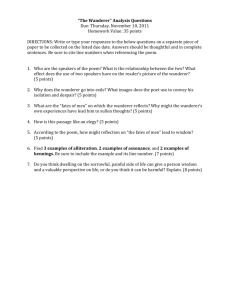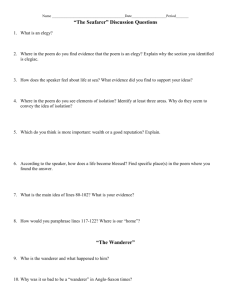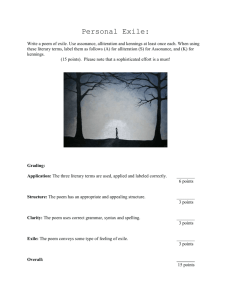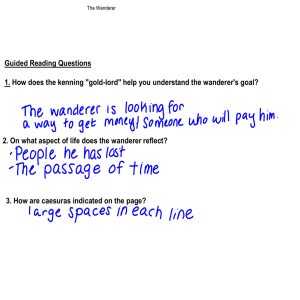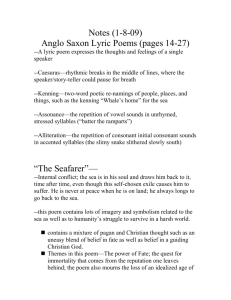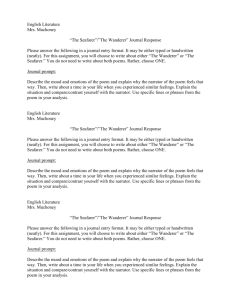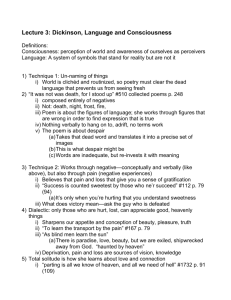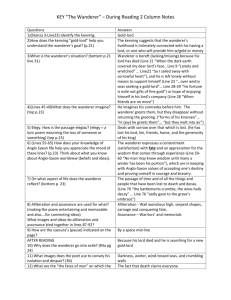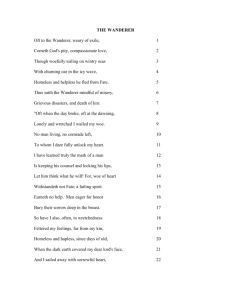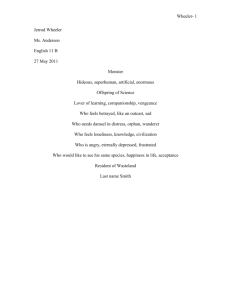"The Wanderer" Poem - Phoenix Union High School District
advertisement
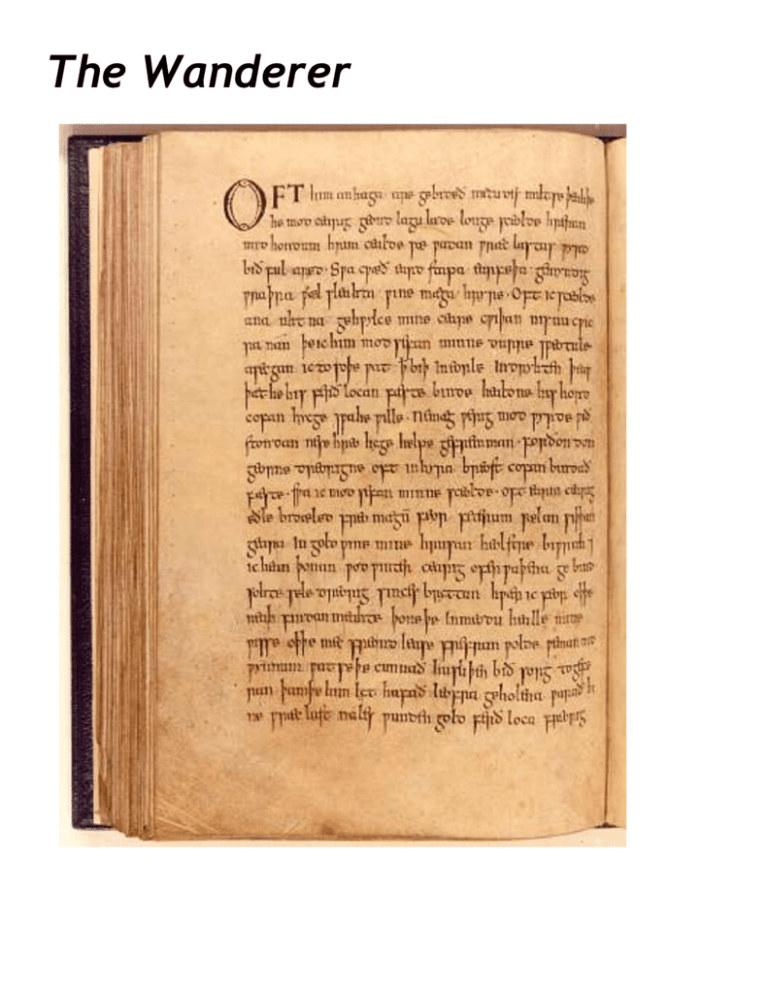
The Wanderer The Wanderer A haven awaits the homeless soul serene waters though wretchedly on the ocean's lanes long must he work the oars in a wintry sea fare as a fugitive. Fate is decreed. So said the exile anguish recalling ruthless killings how his kinsmen fell. All alone early each morning I mourned my loss. There's not a man alive that I dare tell my tale to him the whole truth. I have to admit that it is in a man an admirable thing that he keep his soul's coffer shut hold onto his hoard have in heart what he will. A weary mind can't ward off Fate nor a will in distress weather a storm. And so men of merit make fast a dismal thing deep in the chest. And so should I —severed from home impoverished my people far— tie my tale up tightly as well. Since years ago the earth enshrouded my lord in its darkness and I left there grieving crossed the water in winter-sorrow in search of a hall a sharer of treasure to find one —wherever— far or near who in his mead-hall knew maybe of mine or was willing to further a friendless man lead him to gladness, I learned how it is how very keen are the cares when a man numbering kin counts but few— exile's circuits not circlets of gold frostbitten limbs not the farmland's plenty. He recalls the guests and getting treasures how his gold-lord had led him yet a lad to the feast. That life was gone. And so I learned how it is to live without the beloved teachings of one's lord and friend. When misery and sleep mixed together ally to afflict the unfortunate exile it seems to him that he hold and kiss his lord and master and lay upon knee hands and head as he had done in times past at the taking of gifts. The wretched man is then roused again sees before him fallow waves seabirds diving spreading feathers lashing sleet and snow allied with hail. Then all the heavier are the heart's wounds the longing for a loved one. Loss is renewed when memory sends the mind out and it hails with its song hoping always to see one's friends. The seafaring soul swims back again bound to return with hardly a chorus of voices. Care is renewed for one who sends his weary mind again and again across the water. And so I cannot think about this world but memory darken my mind when I do. When I think about a thane's life how they so quickly quit the hall angry young men then this middle-earth each and every day disintegrates. And so to grow wise one must spend a few winters in this world. A wise man is patient not too hot-hearted nor too hasty with words. A man bides his time no boasts no oaths until in his rage he recognize where an intemperate will can take things. The sage gets how ghastly it will be when all the world's estate is standing in ruin as now in divers places on this dark earth wind-blasted walls are standing— homes overlaid with layers of ice halls falling apart the powerful lying their bliss all broken brave ones fallen proud by the wall. War claimed some and bore them away. The water-bird took one over high seas. The hoary wolf dealt one his death. Deep in a grave a man buried one blood on his face. This region was cleansed by a ruler of men until —lacking all sound of its citizens— the old stonework of giants stood empty. Whoever then thinks wisely on the wealth of this place and considers deeply this dark life with seasoned mind will seem to recall countless slayings and declaim these words— Where now the horse? Where now the rider? Where now the ring-giver? Where now the high seats? Where the hall-joys? O bright chalice! O chain-mailed warrior! O the dignity of the people! How those days went to naught under night's helm as though they had never been. There stands now where they stood together a wall wondrous high worked with serpent-shapes. The strength of the spear destroyed those men. Bloodthirsty weapon! A wicked fate! And storms assault the stone cliffs. A driving blizzard binds the earth winter's blast then blackness comes night-shadow deepens sends down from the north rough hail heroes assailing. All is suffering in this earthly realm. Things wend to the worse in this world under the heavens. Here fortune is not given. Here friend is not given. Here man is not given. Here maid is not given. All this earthly abode ends in emptiness. So claimed the sage cloaked in thought. Worthy he who is true to his word. A warrior must never reveal his rage avow on his heart unless victory be certain a man decide on defiance. He does well who seeks protection the backing of the father above where for us all a bastion stands. © 1998 Tim Romano The Wanderer is an Old English poem from the 10th century, preserved in the Exeter Book. The date of composition is unknown but most certainly predates 1070 AD, as it was probably part of an earlier, oral literary culture. It is a profoundly mournful poem, to the extent that it is an elegy, in which the speaker, possibly an aged man, speaks of an attack upon his people that happened in his youth. In this attack, his close friends and kin were all killed, and memories of the slaughter have remained with him all his life. He questions the wisdom of the impetuous decision to engage a possibly superior fighting force: the wise man engages in warfare to preserve civil society, and must not rush into battle but seek out allies when the odds may be against him. This speaker finds little glory in bravery for bravery's sake. The Wanderer vividly describes his loneliness and yearning for the bright days past, and concludes with an admonition to put faith in God, "in whom all stability dwells". It has been argued that this admonition is a later addition, as it lies at the end of a poem that is otherwise solely secular in its concerns.
